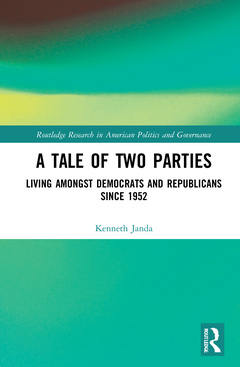A Tale of Two Parties Living Amongst Democrats and Republicans Since 1952 Routledge Research in American Politics and Governance Series

Since 1952, the social bases of the Democratic and Republican parties have undergone radical reshuffling. At the start of this period southern Blacks favored Lincoln?s Republican Party over suspect Democrats, and women favored Democrats more than Republicans. In 2020 these facts have been completely reversed. A Tale of Two Parties: Living Amongst Democrats and Republicans Since 1952 traces through this transformation by showing:
- How the United States society has changed over the last seven decades in terms of regional growth, income, urbanization, education, religion, ethnicity, and ideology;
- How differently the two parties have appealed to groups in these social cleavages;
- How groups in these social cleavages have become concentrated within the bases of the Democratic and Republican parties;
- How party identification becomes intertwined with social identity to generate polarization akin to that of rapid sports fans or primitive tribes.
A Tale of Two Parties: Living Amongst Democrats and Republicans Since 1952 will have a wide and enthusiastic readership among political scientists and researchers of American politics, campaigns and elections, and voting and elections.
1. Stability and Change in the American Polity 2. Partisan Identities 3. Party Organization and Social Groupings 4. Region: Once Primary, Now Secondary 5. Income: Slight, Steady, and Increasing Difference 6. Urbanization: Shifting Effects 7. Education: Incremental Reversal 8. Religion: Important and in Flux 9. Ethnicity: Dwindling Whites 10. Ideology: Partisan Cause or Partisan Effect? 11. Reviewing the Survey Data 12. Baneful Effects 13. Donald Trump’s Last Hurrah Appendix A: Equal Group Appeal Formula Appendix B: Party Base Concentration Formula Appendix C: Poll Questions Asking Respondents’ Ideology, 1935-1969
Kenneth Janda is Payson S. Wild Professor Emeritus of Political Science at Northwestern University. He is co-founder of the international journal Party Politics; co-author of The Challenge of Democracy: American Government in Global Politics, 15th Ed. (2021); author of Party Systems and Country Governance (2011); and The Emperor and the Peasant (2018). He received the Samuel J. Eldersveld Lifetime Achievement Award from the American Political Science Association’s Political Parties and Organizations Section in 2000, and the APSA’s Frank J. Goodnow Award for service to the discipline and profession in 2009.
Date de parution : 09-2022
15.2x22.9 cm
Date de parution : 03-2021
15.2x22.9 cm
Thème d’A Tale of Two Parties :
Mots-clés :
Single Member Districts; RNC; American Government; Illinois State Normal University; Political Behavior; Two Parties; Political Participation; Republican Identifiers; Voting and Elections; Party Identification; Campaigns and Elections; Group Appeal; Political Parties; Democratic Party; Base Concentration; Republican Party; American National Election Studies; Grand Old Party (GOP); Face To Face; American Politics; Concentration Scores; Voting Behavior; ANES Survey; Identity Politics; Vertical Bar Chart; Politics and Religion; Ethnic Minority Voters; ANES Respondents; Political Ideology; Electoral Votes; Democratic-Republican Party; Social Cleavage; American party politics; Party Appeals; sport team identification; Liberal Conservative Continuum; social identity theory; Democratic Identifiers; partisan identity; Ideological Self-placement; National Committees; Mammoth Cave National Park



